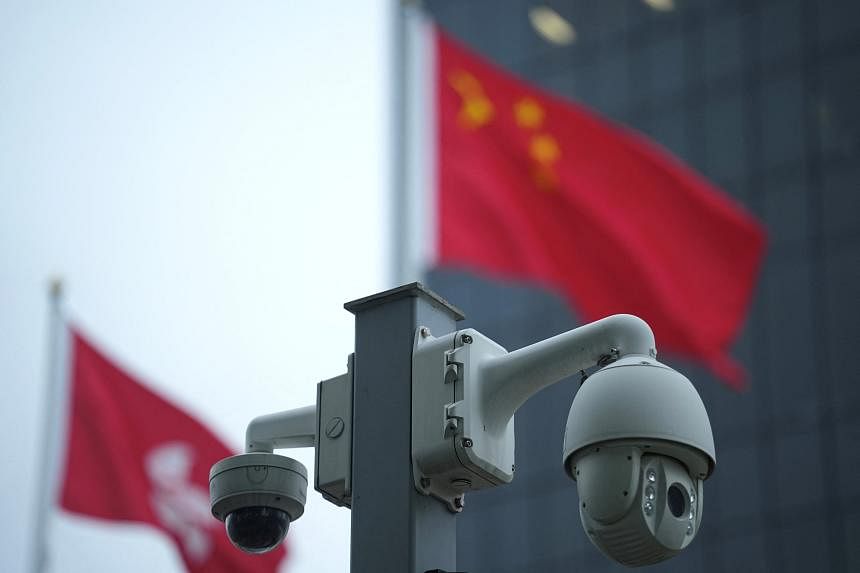Hong Kong is about to embark on the next step towards putting in place a controversial domestic national security law, after a month-long consultation on the proposed legislation ends on Feb 28.
On Feb 22, the city welcomed Mr Xia Baolong, Beijing’s top official overseeing Hong Kong affairs, who is on a week-long fact-finding visit. Local media cited government insiders as saying he would be gathering feedback on the planned law during his trip.
Chief Executive John Lee said on Feb 20 that most opinions gathered so far supported the proposed law. But the move has divided some within Hong Kong society, as well as the international community.
Hong Kong is required under Article 23 of the Basic Law, the city’s mini-Constitution, to implement its own national security legislation, and Mr Lee pledged in his policy address in October that his administration would see through the long-delayed move in 2024.
The leader will report the findings of the 30-day consultation exercise to the legislature in due course, but has given no timeline for when the draft Bill will go before lawmakers.
“The general consensus is that if we can do it one day earlier, we should do it one day earlier,” Mr Lee told reporters on Feb 20. “Because the threat (against national security) continues, and the threat has been mounting, so we must gear up our efforts to ensure that we will do it as soon as possible.”
Hong Kong’s domestic national security law has been a highly politically sensitive topic; a 2003 bid to introduce it resulted in the Bill being dropped after half a million Hong Kongers took to the streets in protest.
The latest iteration of the planned law will complement the 2020 Beijing-imposed national security legislation.
It will cover five types of new offences – treason, insurrection, theft of state secrets and espionage, sabotage endangering national security and external interference.
Hong Kong officials have over the past week issued several rebuttals to those who oppose the proposed law.
The government on Feb 20 condemned “skewed remarks” by Britain-based NGO Hong Kong Watch and more than 80 other activist groups from countries including the United States and Canada, which warned that the legislation and its vague provisions would “further devastate human rights protections in Hong Kong” and “dramatically undermine the Hong Kong people’s due process and fair trial rights”.
“The joint statement smacks of deliberate smears… those organisations completely disregarded relevant laws of the countries in which they are situated… exposing their sheer hypocrisy and double standards,” the government said.
A day earlier, Security Secretary Chris Tang sought to dispel assertions by British minister Tom Tugendhat that the law would result in the “destruction” of Hong Kong, as well as comments by former Hong Kong governor Chris Patten questioning its necessity.
The security chief also slammed US-funded news station Radio Free Asia for falsely reporting that the legislation was designed to target the media.
“It is wrong, and false,” Mr Tang said on Feb 19. “We target only those who could pose threats to national security. There are sufficient safeguards to protect all people, especially media reporting.”
A survey conducted by the Hong Kong Journalists Association (HKJA) in February, however, found that three in four of its respondents believe the new law will negatively affect press freedom in the city.
Some HKJA members were concerned about correspondents who work for foreign media outlets that are subsidised by overseas governments, its chairman Ronson Chan said.
HKJA, the city’s largest press group, had previously called for a public interest defence to be added to the proposed legislation to protect journalists from unlawful disclosure of state secrets.
But it was not among the press groups whose views the authorities sought in the consultation exercise.
Public disagreements over the home-grown security law have also surfaced among Hong Kong politicians in recent days.
Ms Joephy Chan – a lawmaker from the city’s largest labour union, the Federation of Trade Unions, who is also a YouTube influencer with some 313,000 subscribers – posted a clip on the video-sharing platform on Feb 16 criticising former Legislative Council president Jasper Tsang for his views on the proposed legislation.
Her remarks came after Mr Tsang – a founding member of the pro-Beijing Democratic Alliance for the Betterment and Progress of Hong Kong (DAB) party, but whose political views are seen as fairly moderate – listed some concerns about the impending law in an opinion piece published in local Chinese-language newspaper Ming Pao on Feb 6.
His article questioned, among other points, if the proposed definition of sedition was too broad.
“Jasper Tsang’s article seems more to be questioning than supporting the Article 23 legislation,” Ms Chan said in her video, accusing the politician of “becoming a traitor in such a critical time”.
Mr Tsang did not respond to the criticism, but his fellow DAB lawmaker Steven Ho on Feb 22 waded into the fray to denounce those who “attack scholars and politicians expressing legitimate views”.
“Not all people who hold doubts towards the legislation oppose the legislation,” Mr Ho said.
On the business front, commerce groups in Hong Kong have welcomed the proposed law.
The Hong Kong General Chamber of Commerce, the Chinese Manufacturers’ Association of Hong Kong, the Federation of Hong Kong Industries and the Chinese General Chamber of Commerce said in a joint statement in late January that implementing the legislation would provide a solid framework to protect national security and improve the overall business environment and investment sentiment.
Veteran lawmaker Regina Ip and the city’s former leader Leung Chun-ying have both urged officials to better explain the specificities of the planned law to the world.
“The government needs to double down on explaining the nature of the offence of external interference (to foreign media, firms and diplomats),” Mrs Ip said during a session at the Foreign Correspondents’ Club on Feb 19.
Mr Leung, meanwhile, pointed out that Article 23 would be comparable with countries that have their own national security laws, including Singapore.
“We haven’t talked enough about other places to illustrate that Hong Kong is not the only place imposing security legislation,” Mr Leung told the South China Morning Post.
Many jurisdictions have enacted their own legislations to protect their national security, including the US, Britain and Canada.


